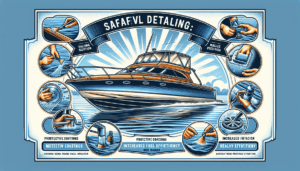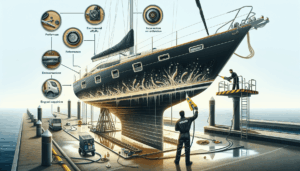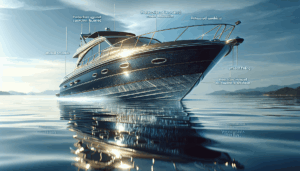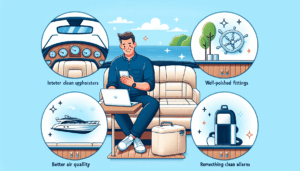Are you wondering how boat detailing can improve fuel efficiency? Ace Mobile Detailing, a professional detailing shop based in Orange Beach, AL, is here to provide you with the answers. With their team of licensed and insured experts, they specialize in automotive detailing, boat detailing, RV detailing, aircraft detailing, and ceramic coatings. Their mission is simple – to enhance the appearance of your vehicle or boat while making you feel amazing. In this article, we will explore the top 7 benefits of boat detailing for improving fuel efficiency. Prepare to be amazed by the transformative power of a detailed boat.
Removal of Algae and Marine Growth
Algae and marine growth increase drag on the boat
Algae and marine growth can quickly accumulate on the hull of your boat, especially if it spends a lot of time in the water. These organisms attach themselves to the surface and create a rough texture, increasing drag as you move through the water. The resistance caused by algae and marine growth can significantly impact the fuel efficiency of your boat.
Removal of algae and marine growth improves fuel efficiency
By regularly removing algae and marine growth from your boat’s hull, you can improve its fuel efficiency. When the hull is clean and free from any obstructions, there is less drag as you navigate through the water. This reduction in drag allows your boat to move more smoothly, requires less effort from the engine, and ultimately leads to better fuel economy.
Hull Cleaning
Accumulation of dirt and debris on the hull creates resistance
Over time, dirt, debris, and other pollutants can accumulate on the hull of your boat. This accumulation creates resistance as your boat moves through the water. Just like algae and marine growth, this resistance increases drag and negatively impacts your fuel efficiency.
Cleaning the hull reduces drag and improves fuel efficiency
Regularly cleaning your boat’s hull can help reduce drag and improve fuel efficiency. By removing the accumulated dirt and debris, you are eliminating the extra resistance that your boat has to overcome. This smoother surface allows your boat to glide through the water with less effort, resulting in improved fuel economy.

Regular Propeller Maintenance
A damaged or dirty propeller can reduce fuel efficiency
The propeller plays a crucial role in the performance and fuel efficiency of your boat. If the propeller is damaged or dirty, it can disrupt the flow of water and reduce the efficiency of propulsion. A damaged propeller can cause an imbalance in the system, leading to increased fuel consumption.
Regular propeller maintenance ensures optimal performance and fuel efficiency
To maintain optimal fuel efficiency, it is essential to regularly inspect and maintain your boat’s propeller. Make sure it is free from any damage, such as dents or bent blades, and clean of any debris or marine growth. Keeping your propeller in good condition will help ensure that it operates efficiently and maximizes fuel consumption.
Optimizing Trim and Tilt
Incorrect trim and tilt settings can increase fuel consumption
The trim and tilt settings of your boat affect how it sits in the water and the angle at which it moves. Incorrectly adjusted trim and tilt settings can increase the resistance your boat faces, leading to higher fuel consumption. It is essential to find the right balance to optimize fuel efficiency.
Properly adjusting trim and tilt improves fuel efficiency
By properly adjusting the trim and tilt settings of your boat, you can improve its fuel efficiency. Achieving the correct balance allows your boat to move through the water more smoothly, reducing drag and improving overall performance. Experiment with different settings to find the sweet spot that maximizes fuel economy.

Cleaning and Polishing the Deck and Topsides
Accumulated dirt, salt, and grime on the deck and topsides create drag
The deck and topsides of your boat are constantly exposed to the elements, including dirt, salt, and grime. Over time, these substances can accumulate and create drag as your boat moves through the water. This extra resistance can lead to decreased fuel efficiency.
Cleaning and polishing the deck and topsides reduce resistance and improve fuel efficiency
Regularly cleaning and polishing the deck and topsides of your boat can improve its fuel efficiency. By removing the accumulated dirt, salt, and grime, you are reducing the resistance your boat faces in the water. This smooth surface allows for better movement, resulting in improved fuel economy.
Regular Engine Maintenance
Neglected or poorly maintained engines consume more fuel
Engines that are neglected or poorly maintained can consume more fuel than necessary. Issues such as worn-out spark plugs, dirty air filters, or improper fuel mixtures can affect the engine’s performance and fuel efficiency. Regular maintenance is crucial to ensure optimal fuel consumption.
Regular engine maintenance ensures optimal fuel efficiency
To maintain optimal fuel efficiency, it is important to prioritize regular engine maintenance. This includes routine inspections, oil changes, filter replacements, and spark plug checks. By keeping your engine in good condition, you can ensure that it operates efficiently and minimizes fuel consumption.
Propeller Tuning and Balancing
Unbalanced or misaligned propellers can increase fuel consumption
Propellers that are unbalanced or misaligned can disrupt the flow of water and increase fuel consumption. These issues can cause increased resistance, resulting in reduced fuel efficiency. Proper tuning and balancing of your propellers are vital for optimal performance.
Propeller tuning and balancing improve fuel efficiency
By properly tuning and balancing your boat’s propellers, you can improve its fuel efficiency. This process involves adjusting the blades’ angles and making sure they are aligned correctly. Balanced propellers allow for better water flow and decrease drag, resulting in improved fuel economy.
Application of Protective Coatings
Protective coatings reduce friction and resistance
Applying protective coatings to the hull and other surfaces of your boat can enhance its fuel efficiency. These coatings create a smooth and protective layer that reduces friction and resistance. By minimizing drag, the boat can move more efficiently through the water, ultimately improving fuel consumption.
Reduced friction enhances fuel efficiency
The application of protective coatings reduces friction, which enhances the fuel efficiency of your boat. These coatings create a slick surface that allows your boat to glide through the water with minimal effort. This reduced resistance translates to better fuel economy and savings in the long run.
Cleaning and Tuning the Fuel System
Dirty or clogged fuel systems can decrease fuel efficiency
A dirty or clogged fuel system can significantly impact the fuel efficiency of your boat. Deposits and debris in the fuel tank, filters, or injectors can restrict the flow of fuel, leading to inefficient combustion. This inefficiency results in increased fuel consumption.
Regular cleaning and tuning of the fuel system improve fuel efficiency
To ensure optimal fuel efficiency, it is necessary to clean and tune your boat’s fuel system regularly. This includes cleaning the fuel tank, replacing filters, and inspecting injectors for any blockages or deposits. By maintaining a clean and well-functioning fuel system, you can improve combustion efficiency and maximize fuel economy.
Proper Weight Distribution
Improper weight distribution affects boat stability and fuel efficiency
The distribution of weight on your boat can greatly impact its stability and fuel efficiency. If the weight is not properly distributed, it can affect how the boat sits in the water, leading to increased drag and fuel consumption. Achieving proper weight distribution is crucial for optimal performance.
Achieving proper weight distribution enhances fuel efficiency
By ensuring proper weight distribution on your boat, you can enhance its fuel efficiency. Distribute the weight evenly throughout the boat, keeping in mind the manufacturer’s recommendations and guidelines. Proper weight distribution allows for better balance and stability, reducing drag and overall fuel consumption.
In conclusion, improving the fuel efficiency of your boat is crucial for both cost savings and environmental sustainability. By addressing issues such as algae and marine growth, hull cleanliness, propeller maintenance, trim and tilt optimization, deck and topside cleaning, engine maintenance, propeller tuning and balancing, protective coatings, fuel system cleaning and tuning, and proper weight distribution, you can maximize your boat’s fuel economy and enjoy more efficient and enjoyable boating experiences. Remember to regularly maintain and clean your boat to keep it in the best condition possible and achieve optimal fuel efficiency.





